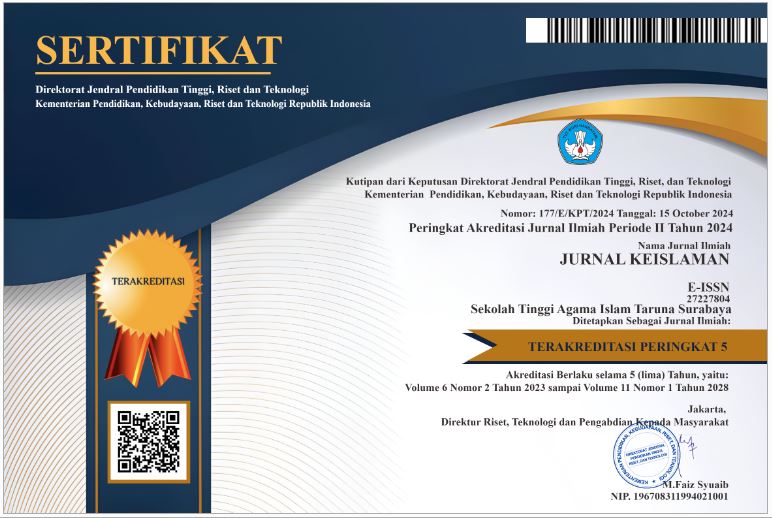Model Pendidikan Akhlak dalam Kitab Nashoihul Ibad Karya Syeikh Imam Nawawi Al-bantani
DOI:
https://doi.org/10.54298/jk.v7i1.248Keywords:
Moral Education, Syeikh Imam Nawawi Al-bantani, Book Nashoihul IbadAbstract
The importance of developing moral education which includes holistic and sustainable aspects has highlighted attention to the moral education model. The book "Nashoihul Ibad" written by Sheikh Imam Nawawi Al-bantani is widely recognized as one of the main references in efforts to enrich Islamic morals. This research aims to conduct an analysis of the moral education model contained in the book "Nashoihul Ibad". The research method uses library research. The research results explain that moral education in the Nashoihul Ibad book consists of three models: First, moral education by instilling awareness about divinity and its relationship with humans. Second, moral education through the formation of noble attitudes and behavior and relationships with fellow humans. Third, moral education further develops personal qualities including fortitude, honesty, courage and responsibility in a social context.
Downloads
References
Bagir, Haidar, Mengenal Tasawuf (Noura Books, 2019)
Bukhori, Imam, ‘Satlogi SANTRI Pesantren Zainul Hasan Genggong Pajarakan Probolinggo: Local Genius Penguat Karakter Bangsa’, HUMANISTIKA: Jurnal Keislaman, 6.1 (2020), 1–33
Farhan, Ahmad, ‘Pemikiran Zuhud Abu Talib Al-Makki: Relevansi Dan Implementasi Sikap Hedonisme Pada Remaja’, Spiritualita, 7.2 (2023), 135–44
Hidayat, Ahmad Wahyu, and Muhammad Iqbal Fasa, ‘Syekh Nawawi Al-Bantani Dan Pemikirannya Dalam Pengembangan Pendidikan Islam’, Khazanah: Jurnal Studi Islam Dan Humaniora, 17.2 (2019), 297–317
Iman, Meraih, and Yang Sempuri, ‘77 Menyingkap Rahasia Cabang Keimanan Terjemah Dari Kitab Qami’ut Tughyan’
Kamila, Aiena, ‘Pentingnya Pendidikan Agama Islam Dan Pendidikan Moral Dalam Membina Karakter Anak Sekolah Dasar’, Al-Furqan: Jurnal Agama, Sosial, Dan Budaya, 2.5 (2023), 321–38
Kanafi, H Imam, Ilmu Tasawuf: Penguatan Mental-Spiritual Dan Akhlaq (Penerbit NEM, 2020)
Khafiyah, Mubaedah Ana, ‘Konsep Pendidikan Akhlak Menurut Syeikh Nawawi Al-Bantani Dalam Kitab Nashaihul ’Ibad’ (SEKOLAH TINGGI ILMU TARBIYAH (STIT) PEMALANG, 2023)
Khoiriyah, Lailatin Nikmatul, ‘Ikhlas Dalam Al-Quran (Studi Tafsir Tematik Melalui Pendekatan Munasabah)’ (IAIN Ponorogo, 2021)
Mansyuriadi, M Irwan, ‘Implementasi Pendidikan Akhlak Dalam Membentuk Kepribadian Muslim Peserta Didik’, Pandawa, 4.1 (2022), 14–22
Mubarok, Ali, ‘Nashaihul Ibad’, ed. by Sabilul Haq, Saku (Kediri-Indonesia: Pustaka ISYFA’ LANA, 2023)
Muhrin, ‘Akhlak Kepada Diri Sendiri’, Tarbiyah Islamiyah: Jurnal Ilmiah Pendidikan Agama Islam, 10 (2020), 1–7 <https://jurnal.uin-antasari.ac.id/index.php/tiftk/article/view/3768>
Muhrin, Muhrin, ‘Akhlak Kepada Diri Sendiri’, Tarbiyah Islamiyah: Jurnal Ilmiah Pendidikan Agama Islam, 10.1 (2020)
Pringgar, Rizaldy Fatha, and Bambang Sujatmiko, ‘Penelitian Kepustakaan (Library Research) Modul Pembelajaran Berbasis Augmented Reality Pada Pembelajaran Siswa’, IT-Edu: Jurnal Information Technology and Education, 5.01 (2020), 317–29
Rifai, Ahmad, ‘Pendidikan Karakter Dan Pendidikan Akhlak’, Al Qalam: Jurnal Ilmiah Keagamaan Dan Kemasyarakatan, 2018
Saihu, Saihu, and Baeti Rohman, ‘Pembentukan Karakter Melalui Model Pendidikan Transfromatife Learning Pada Santri Di Pondok Pesantren Nurul Ikhlas Bali’, Edukasi Islami: Jurnal Pendidikan Islam, 8.02 (2019), 435–52
Subagiya, Bahrum, ‘Eksplorasi Penelitian Pendidikan Agama Islam Melalui Kajian Literatur: Pemahaman Konseptual Dan Aplikasi Praktis’, Ta’dibuna: Jurnal Pendidikan Islam, 12.3 (2023), 304–18
Tantowi, H Ahmad, Pendidikan Islam Di Era Transformasi Global (PT. Pustaka Rizki Putra, 2022)
Widiyastuti, Retno, Kebaikan Akhlak Dan Budi Pekerti (Alprin, 2020)
Wirinata, Adi Candra, Tasawuf Sosial (Memahami Islam Rahmah Lil Alamin Perspektif Hablun Min Allah Wa Hablun Min an-Nas) P2 (GUEPEDIA, 2022)
Downloads
Published
How to Cite
Issue
Section
License
Copyright (c) 2024 Siti Aminatus Sya’diyah, Ahmad Fauzi, Ummi Lailia Maghfiroh

This work is licensed under a Creative Commons Attribution-ShareAlike 4.0 International License.
Authors who publish with this journal agree to the following terms:
- Authors retain copyright and grant the journal right of first publication with the work simultaneously licensed under a Creative Commons Attribution-ShareAlike 4.0 that allows others to share the work with an acknowledgement of the work's authorship and initial publication in this journal.
- Authors are able to enter into separate, additional contractual arrangements for the non-exclusive distribution of the journal's published version of the work (e.g., post it to an institutional repository or publish it in a book), with an acknowledgement of its initial publication in this journal.
- Authors are permitted and encouraged to post their work online (e.g., in institutional repositories or on their website) prior to and during the submission process, as it can lead to productive exchanges, as well as earlier and greater citation of published work (See The Effect of Open Access).


















